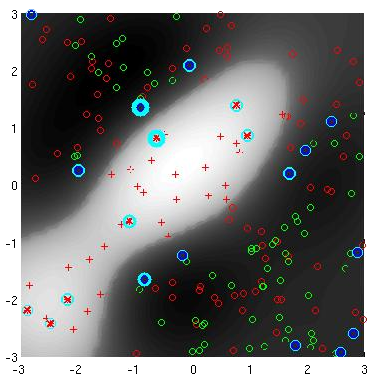 |
Multiple Instance Learning |
|---|
 |
Multiple Instance Learning |
|---|
Multiple Instance Learning (MIL) is a special learning framework which deals with uncertainty of instance labels. In this setting training data is available only as pairs of bags of instances with labels for the bags. Instance labels remain unknown and might be inferred during learning. A positive bag label indicates that at least one instance of that bag can be assigned a positive label. This instance can therefore be thought of as a witness for the label. Instance in negative labelled bags are altogether of the negative class, so there is no uncertainty about their label.
There exist quite an amount of literature to the Multiple Instance Learning problem. This website provides an overview of the MIL related research at this institute and hosts software we made available as well as datasets.
In [1] we describe how we can jointly learn a linear discriminant as well as parameters of a modified set kernel that solves the multiple-instance problem. Base kernels are modified conformally to emphasize regions of the input space that are discriminative while de-emphasizing regions that contain patterns from both positive and negative bags.
In [2] we presented a SVM formulation for the MIL problem and presented a deterministic annealing approach to infer the missing instance labels during learning. This formulation is based on the work of Andrews et.al., identifies a shortcoming of their approach and extends the formulation to overcome it.
The code used for the experiments in this paper is based on the machine learning toolbox The Spider. This README describes the installation of this package. If you are familiar with spider you might want to download directly the code and/or the benchmark datasets.
| [1] Conformal Multi-Instance Kernels, Matthew B. Blaschko and Thomas Hofmann, NIPS'06 Workshop on Learning to Compare Examples, 2006 |
| [2] Deterministic Annealing for Multiple-Instance Learning, Peter V. Gehler and Olivier Chapelle, AISTATS 2007 |